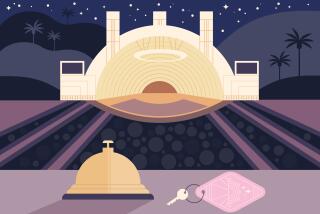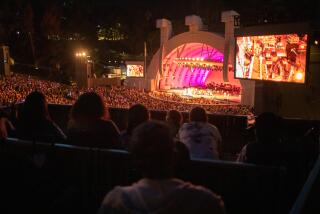Where the nuts are off the shelf
BERKELEY — As most veteran customers know, it takes a pretty thick skin to successfully navigate the Berkeley Bowl, this strident city’s most popular grocery store.
Outside, petitioners seeking signatures for ballot measures have come to blows with opinionated residents. In the tiny parking lot, nicknamed the Berkeley Brawl, frustrated motorists have been known to ram one another’s cars. At the checkout, people have thrown punches and unripened avocados at suspected line-cutters.
When one shopper was told she couldn’t return a bag of granola, she showily dumped its contents on the floor. Culyon Garrison, who works at the customer-service desk, recently had a loaf of bread thrown at him.
The produce emporium -- one of the nation’s most renowned retailers of exotic fruits and vegetables -- creates its own bad behavior. Kamikaze shoppers crash down crowded aisles without eye contact or apology for fender-benders. So many customers weren’t waiting to pay before digging in that management imposed the ultimate deterrent: Those caught sampling without buying will be banned for life -- no reprieves, no excuses. (Not even “I forgot to take my medication.”)
Raphael Breines, who was ejected last year for eating on the premises, said he couldn’t decide between two types of apricots, so he sampled both. Security stopped him in the parking lot.
“They treated me like a thief,” said the 37-year-old park planner, who was photographed and required to sign a no-trespass agreement. “Technically I was stealing, but I wasn’t trying to hide anything. I was just deciding which type of apricot to buy.”
Breines, a longtime customer, sent an apology letter, asking to be reinstated. His request was denied.
Store manager Larry Evans says the policy is a fair response to doctors, lawyers and college professors who help themselves to bags of cookies, nuts and vitamins, stick their fingers in pies and guzzle from bottles of sake, assuming the rules don’t apply to them.
“There’s a sense of entitlement to this town,” Evans said. “People think, ‘If I want to do it, I’ll do it, just try and stop me.’ ”
Seven years on the job, he said, has given him insight into the city’s sometimes sharp social elbows.
“Berkeley residents are angry -- they’re mad at the president, the economy, all kinds of stuff. And this is the place where it seems to get released, the local supermarket.”
--
Longtime Berkeley residents also think they have a grip on the good life, so being banned from the Bowl is no small matter. On a typical summer day, a shopper at the Bowl is likely to find 20 kinds of apples, eight types of mangoes, half a dozen varieties of papaya, six kinds of garlic, five types of ginger and 40 different tomatoes.
Glenn and Diane Yasuda opened their market in 1977 in a nearby bowling alley. They specialized in produce from the start, creating a section that today is among the largest on the West Coast if not the nation.
A decade ago, the store moved to its current larger headquarters. But kaleidoscopic choice is still Glenn Yasuda’s business recipe.
“When it comes to food,” says Yasuda, 74, “Berkeley shoppers will try anything.”
Five mornings a week, usually before 3 a.m., Yasuda rises to scour several wholesale produce markets, hand-selecting the fruit and vegetables that will soon fill his shelves: Barhi dates, Gravenstein apples, Flame seedless grapes, Idaho pears.
Yasuda, whose father and grandfather were Los Angeles produce farmers, wants to handle the merchandise. “Before you buy anything,” he says, “you have to smell it, taste it.”
He knows his customers expect new taste sensations. They often corner him, asking him how to prepare produce they’re seeing for the first time.
Local chefs savor the store.
“The produce section’s like an orchestra,” said Ryan Scott, executive chef at San Francisco’s Mission Beach Cafe. “The last time I was there, the cucumbers were just screaming at me. As a chef, it’s often hard to get excited about food. But I get excited there.”
Produce accounts for 30% of the Bowl’s sales, nearly triple the percentage of most grocery stores nationwide.
On an average summer Friday, three tractor-trailer loads of produce are delivered to the Bowl to get customers through the weekend. Often, it’s still not enough to meet the demand. So Yasuda soon will open a second store nearby to take some pressure off his flagship.
One shopper said she asked her mother, who was visiting from out of town, if she liked the Bowl’s produce section. “You know in that book ‘The Lovely Bones,’ where you get to pick what your heaven looks like?” the mother answered, gazing at the selection. “This would be mine.”
--
Each morning, the early birds wait in line for the Berkeley Bowl to open.
Then the rush is on -- the elbowing and scrambling to reach the shelves of reduced-price produce that can be bought in bulk. The scene is so madcap, the store used to play the “Call to the Post” theme used in horse racing. Now management enforces a no-running policy -- because when Berkeley switches into hunter-gatherer mode, things can quickly get out of hand.
The Internet site Yelp, where customers review restaurants and other stores, has hundreds of entries about the Bowl. One writer said weekends were the craziest, when “you don’t wander through the aisles as much as hack through the underbrush of nose rings and cloth shopping bags with a machete, only to count the minutes you creep closer to death at the checkout line.”
Like the city itself, the Bowl is idiosyncratic. With its weird yin comes a gracious yang: shoppers who greet strangers like old friends and point out the best bargains.
But other things get pointed out too. Your cart is at the wrong angle. You didn’t replace that apple where you found it. Tell your child to stop playing with that plastic bag -- it’s a choking hazard. One customer said he thinks he’s come up with the perfect city bumper sticker: “Welcome to Berkeley: Now please stop doing that!”
Once, caterer Francisco Machado was at the checkout, talking on his cellphone, when he got a shoulder tap.
“I made a remark to a friend, ‘Dude, this place is a meat market!’ And the guy behind me took offense. He started shouting that what I said was really sexist,” Machado recalled. “He wouldn’t let it go. I finally had to turn around and say, ‘Mind your own business.’ ”
On a recent day, shopper Jean Sirius, a local editor, was standing in the produce section explaining the store culture. “There is a goddess Oblivion, and she has many devotees who shop here,” she said. But before she could say more, a male shopper in a sweat suit removed his iPod earphones and barked: “Hey, you’ve been taking up space there for too long! Why don’t you move aside so the rest of us can do some shopping?”
Michael Pollan, author of the best-selling book “The Omnivore’s Dilemma,” is a Bowl regular who calls the store one of his top three places to buy food in the world. Still, he knows there’s easier shopping.
One time, Pollan was picking out a box of cereal for his daughter when a fellow shopper interrupted him. “He said, ‘I’m watching Michael Pollan shop for groceries,’ ” Pollan recalled. “There was this note of disappointment that I was buying Fruity Pebbles. Berkeley is full of hall monitors. It’s a small town, and people are looking into each other’s baskets.”
Diane Yasuda allows a fair share of customer quirkiness, but she does draw the line -- politely but firmly.
“I don’t like to see them berate employees,” she said. “I’ll say, ‘I’m sorry, but we just can’t seem to please you. Why don’t you shop somewhere else?’ ”
Glenn Yasuda, meanwhile, can only shake his head. He employs a produce-buyers’ philosophy when sizing up his Berkeley customers.
“For every bad apple,” he said, “you’ve got 100 good ones.”
--
More to Read
Eat your way across L.A.
Get our weekly Tasting Notes newsletter for reviews, news and more.
You may occasionally receive promotional content from the Los Angeles Times.











